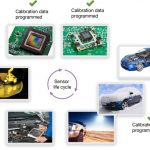The electronic content in automotive is exploding, the market for automotive electronics systems is expected to grow from $170 billion in 2011 to $266 billion by 2016 (Strategy Analytics). When you seat in a brand new car, you immediately see the difference with a ten or even five years old vehicle, as you can exercise MP3 music readers,… Read More
Semiconductor Intellectual Property
ARM’s Quarterly Results: Licensing Strong, Royalties Weak, Future is Bright
Last week was ARM’s quarterly earnings call. Simon Segars, the CEO, and Tim Score, the CFO, presented from London.
First, the numbers:
- revenue was up 17% year-on-year in dollar terms to $309.6M, but only 9% in Sterling terms due to exchange rate moves to £187.1
- profit before tax was $94.2M
- licensing was up 42% year-on-year
A Win-Win Royalty Deal Structure in IP Business
Royalty is a critical component in any IP deal. SoC companies want IP companies to share the risk of success (or failure) of their SoC and to enable that they want IP vendors to accept a substantial part of their payment to be paid as royalty. But the customers are also not very interested to shell out huge money to IP companies if the SoC… Read More
CEVA creating a wearable IP platform
Processor and GPU cores usually get the limelight, driven by the ARM and Imagination machines occupying the center square of most SoC designs. CEVA has quietly been assembling DSP IP in most of the squares around the edge, and may have just reached critical mass for wearables and IoT devices.… Read More
Atmel Licenses Mali and Security from ARM
Atmel (and ARM) announced yesterday that Atmel has licensed a portfolio of ARM IP for devices that require video, image and display capabilities. This portfolio includes Cortex-A7 (a 32-bit core), Mali-V500 (a video accelerator), Mali-DP500 (a display processor) and TrustZone technology (security technology). These can… Read More
NoCs for system-level power management
Most of the buzz on network-on-chip is around simplifying and scaling interconnect, especially in multicore SoCs where AMBA buses and crossbars run into issues as more and more cores enter a design. Designers may want to explore how NoCs can help with a more power-aware approach.… Read More
Improve Your Memory the Sonics Way
There is never enough memory bandwidth. Well, occasionally there is but many SoCs have lots of blocks that communicate through memory, typically off-chip DRAM. In 2001 Sonics created their first solution to this problem with MemMax technology that was incorporated into their SonicsSX product. This has been used in over 100 designs… Read More
Andes Plays an ACE
There is a perception that ARM is the only microprocessor game in town due to their strong position in many markets, especially mobile. In areas where the instruction set shows through, then this is probably true. There is no rush to build smartphones where the application processor is something else. But even in a phone there are… Read More
Thread is why Nest has extra 802.15.4 goodies
From last week: “Chipmakers can’t afford to wait on the sidelines, hoping their standard fare gets picked up and fits in with one of these [#IoT]teams.” This week, it’s ARM, Freescale, and Silicon Labs joining with Google and others on Thread. Yet another consortium? A lot more to this story.… Read More
CEVA + Riviera Waves = Complete WiFi and BlueTooth Solution
Thanks to the recent acquisition of Riviera Waves, CEVA is expanding from Digital only DSP IP, to supporting complete solution (Digital + mixed-signal) for both WiFi and Bluetooth functions. Such a move is already a very good market positioning, as customers prefer buying to a single source the digital and the mixed-signal part… Read More



The Name Changes but the Vision Remains the Same – ESD Alliance Through the Years